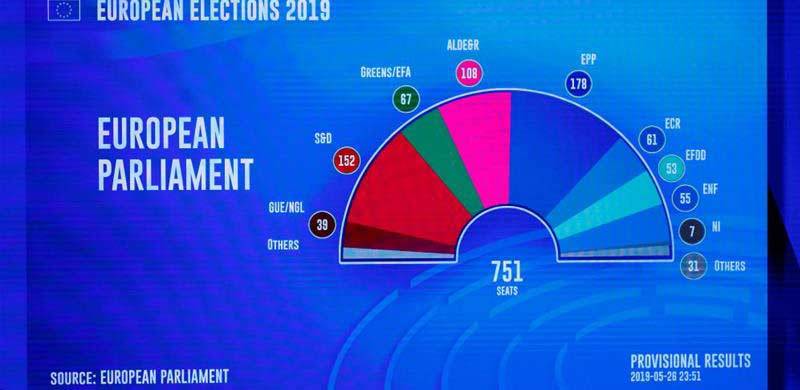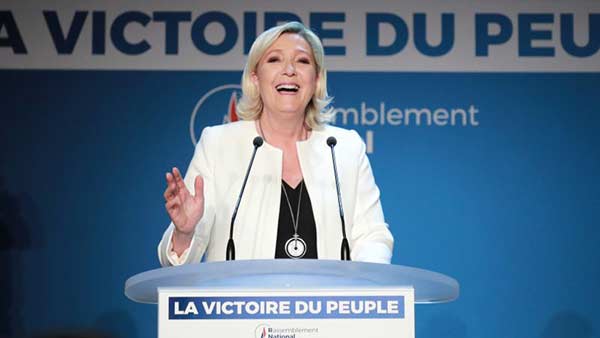
Adeena Tahir in this article explains the EU voter patterns this election and how the doom of neoliberalism is finally upon us. "Most of the rightwing parties such as the one led by Marine Le Pen are not shy being critical of the roles played by immigrants, and this threatens social harmony for Muslims, Jews and other ethnic minorities in those countries", she argues.
This week, Europe went through a mighty display of democratic values as 28 countries underwent world’s second largest election in order to elect their representatives for the new European Parliament. This election indeed occurred at a critical juncture in recent European history and its future trajectory, as perhaps what was once the world’s most influential coalition of countries is now facing consequential questions over how the members want to progress towards their future.
This significance reflected in the polls, as for the first time in the EU Parliament’s recent history, did the polling booths see a record charting 51 percent voter turnout. As it was feared by many, but foreseeable for most, Europe has just witnessed a grand collapse of neoliberal, centrist policies and instead the people there have declared their support in big numbers for far right populist politics.
Nesting on the very extreme spectrums of European politics, these populist parties are expected to be in a fierce pursuit of their right-wing agendas, which would without a doubt create gargantuan challenges for the future of European narrative.
The other unexpected but influential winner of the European polls was the environmentalist parties, which on one hand reflects the urgency with which the people wish to tackle climate issues but also shows the deep divide on the other hand within the European perspectives, as the Green Party resides on the polar opposite to the right-wing populists.
What matters here the most is how the public from almost all of the major powerhouses of this 28-states coalition, showed its deep resentment for the neoliberal policies that have governed European approach for so long.
In France, this was depicted first as the Yellow Vest Movement which was a public outcry against government’s pro-climate policies and now in the form of President Emmanuel Macron’s pro-European and Centralist La Republique En Marche party’s crunching defeat to the far right national party led by Marine le Pen who bagged 23.3 percent of the French votes.

In Italy, Matteo Salivini carved his hard right The League party as the resolute new Italian face by winning 34 percent of the country’s votes. The United Kingdom, which already fell to the right-wing frenzy by opting for Brexit in June 2016, and in fact only contested in the elections because it failed to negotiate its terms of leave from the EU, still reiterated its support for far right politics by giving Nigel Farage’s Brexit Party the winning chunk of its voter polls.
However, as mentioned earlier, those in Europe who wanted to nonetheless split apart from the traditional, centrist politics that have been ruling over Europe for so long, but not into the arms of hardcore right-wing agendas, opted for the surprise contenders like The Greens and other Liberal political parties, who all campaign for environmentally themed, sustainable policies instead. Their most monumental win was in Germany, where they claimed around 20 percent of the country’s votes and cemented themselves as an unshakeable force.
In view of these staggering results, the whole world is now battered with tough questions and decisions to be dealt with. It is clear that the policies of globalisation and privatisation in the name of free markets will soon be facing a structural collapse.

Gates that were once pushed open for traders and consumers to transit across states, countries and continents are now in plans of being dismantled and replaced with great looming walls instead. Like President Trump of the US, who at this point is still demanding that there needs to be built a wall at the Mexico-US border, even if metaphorically. But these barriers will be beyond geographical constructs, and would affect internationally the complex socio-economical and industrial relations.
The conservative, defensive nationalist policies of developed states like those of EU would cause an obstruction in the paths of immigrants who flocked from developing and low middle income countries like Pakistan, or from the war-torn, ethnically conflicted zones including many of the African and Middle East states.
Not only would they likely be refused an asylum and citizenship in the new Europe, but their lives back home are too at risk of being plagued with stunted economical growths. As the cross-country ties of trade and financial supports are harpooned, inflation and poverty rates are expected to skyrocket.
Since the countries of Europe now promise to bring back their trade and industries, and to go after privatisation by centralising their assets once again, this would mean that the foreign large scale manufacturing units and cash flows from investments that once poured into developing countries, providing low wage employment opportunities to local labor in huge masses, would all dry up, leaving behind many without any source of basic incomes for sustenance.
International cooperation can then be expected to break down, and we’ve already started witnessing this effect as our Pakistan’s very own neighbour Iran was abandoned in its Nuclear Deal of 2015 by the United States recently. Another form of this lack of international support could be slashing of foreign aid programmes, which are for some countries and social sectors the pivotal sources of budget.
Lastly, if alliances continue to break, and political leaders of the western world do not alter their strong opinions on globalisation, people would be further disillusioned from each other and fall even deeper into ethnical and racial tensions. Most of the rightwing parties such as the one led by Marine Le Pen are not shy being critical of the roles played by immigrants, and this threatens social harmony for Muslims, Jews and other ethnic minorities in those countries. Hence, if Pakistani expats start returning home, we would see a loss in our foreign remittances.
Therefore, Pakistan and other developing countries are now indeed facing the dilemma of having to navigate through turbulent times, while also risking serious undercuts to their resources and support structures on which they once heavily relied on.
It is hence the matter of extreme urgency now that we determine our role in international politics and employ our foreign relations such that we are able to move past this potential crisis with as many financial and political alliances as we can. It is time that we reform our international image, diversify our alliances, and find ways to be more self-sustaining. Perhaps, this would be our only path towards salvation.
This week, Europe went through a mighty display of democratic values as 28 countries underwent world’s second largest election in order to elect their representatives for the new European Parliament. This election indeed occurred at a critical juncture in recent European history and its future trajectory, as perhaps what was once the world’s most influential coalition of countries is now facing consequential questions over how the members want to progress towards their future.
This significance reflected in the polls, as for the first time in the EU Parliament’s recent history, did the polling booths see a record charting 51 percent voter turnout. As it was feared by many, but foreseeable for most, Europe has just witnessed a grand collapse of neoliberal, centrist policies and instead the people there have declared their support in big numbers for far right populist politics.
Nesting on the very extreme spectrums of European politics, these populist parties are expected to be in a fierce pursuit of their right-wing agendas, which would without a doubt create gargantuan challenges for the future of European narrative.
The other unexpected but influential winner of the European polls was the environmentalist parties, which on one hand reflects the urgency with which the people wish to tackle climate issues but also shows the deep divide on the other hand within the European perspectives, as the Green Party resides on the polar opposite to the right-wing populists.
What matters here the most is how the public from almost all of the major powerhouses of this 28-states coalition, showed its deep resentment for the neoliberal policies that have governed European approach for so long.
In France, this was depicted first as the Yellow Vest Movement which was a public outcry against government’s pro-climate policies and now in the form of President Emmanuel Macron’s pro-European and Centralist La Republique En Marche party’s crunching defeat to the far right national party led by Marine le Pen who bagged 23.3 percent of the French votes.

In Italy, Matteo Salivini carved his hard right The League party as the resolute new Italian face by winning 34 percent of the country’s votes. The United Kingdom, which already fell to the right-wing frenzy by opting for Brexit in June 2016, and in fact only contested in the elections because it failed to negotiate its terms of leave from the EU, still reiterated its support for far right politics by giving Nigel Farage’s Brexit Party the winning chunk of its voter polls.
However, as mentioned earlier, those in Europe who wanted to nonetheless split apart from the traditional, centrist politics that have been ruling over Europe for so long, but not into the arms of hardcore right-wing agendas, opted for the surprise contenders like The Greens and other Liberal political parties, who all campaign for environmentally themed, sustainable policies instead. Their most monumental win was in Germany, where they claimed around 20 percent of the country’s votes and cemented themselves as an unshakeable force.
In view of these staggering results, the whole world is now battered with tough questions and decisions to be dealt with. It is clear that the policies of globalisation and privatisation in the name of free markets will soon be facing a structural collapse.

Gates that were once pushed open for traders and consumers to transit across states, countries and continents are now in plans of being dismantled and replaced with great looming walls instead. Like President Trump of the US, who at this point is still demanding that there needs to be built a wall at the Mexico-US border, even if metaphorically. But these barriers will be beyond geographical constructs, and would affect internationally the complex socio-economical and industrial relations.
The conservative, defensive nationalist policies of developed states like those of EU would cause an obstruction in the paths of immigrants who flocked from developing and low middle income countries like Pakistan, or from the war-torn, ethnically conflicted zones including many of the African and Middle East states.
Not only would they likely be refused an asylum and citizenship in the new Europe, but their lives back home are too at risk of being plagued with stunted economical growths. As the cross-country ties of trade and financial supports are harpooned, inflation and poverty rates are expected to skyrocket.
Since the countries of Europe now promise to bring back their trade and industries, and to go after privatisation by centralising their assets once again, this would mean that the foreign large scale manufacturing units and cash flows from investments that once poured into developing countries, providing low wage employment opportunities to local labor in huge masses, would all dry up, leaving behind many without any source of basic incomes for sustenance.
International cooperation can then be expected to break down, and we’ve already started witnessing this effect as our Pakistan’s very own neighbour Iran was abandoned in its Nuclear Deal of 2015 by the United States recently. Another form of this lack of international support could be slashing of foreign aid programmes, which are for some countries and social sectors the pivotal sources of budget.
Lastly, if alliances continue to break, and political leaders of the western world do not alter their strong opinions on globalisation, people would be further disillusioned from each other and fall even deeper into ethnical and racial tensions. Most of the rightwing parties such as the one led by Marine Le Pen are not shy being critical of the roles played by immigrants, and this threatens social harmony for Muslims, Jews and other ethnic minorities in those countries. Hence, if Pakistani expats start returning home, we would see a loss in our foreign remittances.
Therefore, Pakistan and other developing countries are now indeed facing the dilemma of having to navigate through turbulent times, while also risking serious undercuts to their resources and support structures on which they once heavily relied on.
It is hence the matter of extreme urgency now that we determine our role in international politics and employ our foreign relations such that we are able to move past this potential crisis with as many financial and political alliances as we can. It is time that we reform our international image, diversify our alliances, and find ways to be more self-sustaining. Perhaps, this would be our only path towards salvation.
